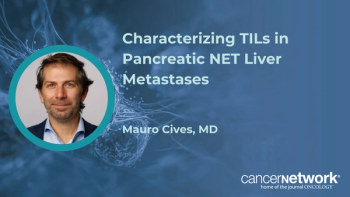
Navigating a ‘Revolutionary Era’ of Targeted Therapy in Pancreatic Cancer
The key to the future of pancreatic cancer treatment is immunotherapy, according to Gregory L. Beatty, MD, PhD.
Prior to his presentation on immunotherapy in pancreatic cancer treatment at the 15th Annual Ruesch Symposium, Gregory L. Beatty, MD, PhD, stated his hope that this type of treatment will start to affect the 5-year survival for patients with metastatic pancreatic cancer.
Beatty, director of Translational Research at the University of Pennsylvania Pancreatic Cancer Research Center and director of the Penn-Incyte Alliance, spoke with CancerNetwork® about the improving 5-year survival rate for surgically resected pancreatic cancer, but highlighted his hope that the 5-year survival rate for metastatic disease, which hasn’t budged for 20 years, will see improvement. Immunotherapy, he said, may be the only way that a benefit can be created in the patient population.
According to Beatty, this is an era of significant development for targeted therapies, as several are undergoing development in clinical trials and starting to show activity. Considering how not all patients are showing signs of activity and some outcomes are transient, however, durable responses are ultimately needed. These targeted therapies, Beatty said, should be combined with immunotherapies to yield durable responses.
Transcript:
I hope that we can start to impact the 5-year survival for patients with metastatic pancreatic cancer. We’re doing well with improving 5-year survival for surgically resected disease, but for metastatic disease, it’s remained 3% for the last 20 years, and we haven’t budged that. My hope is that we can start to improve upon that. [The] only way that we’re going to get there is by finding a way for immunotherapy to have a benefit in this patient population.
One of the important things here is that we are in a revolutionary era, right now, of targeted therapies. There are a number that are going through clinical trials that are starting to show activity, but not all patients are demonstrating activity, and most commonly, treatment responses are transient. These are going to be extremely important tools for us to learn how to use and how to put them together into patient care, but durability is going to be what’s ultimately needed, and history has taught us that harnessing the immune system is where durable responses come from. The next step is thinking about how can we combine these [targeted] therapies with immunotherapies? That means not abandoning our efforts and research around immunotherapy in a wake of very exciting targeted therapy developments.
Reference
Beatty GL.The promise of immunotherapy in pancreatic cancer amidst a landscape of precision medicine. Presented at the 15th Annual Ruesch Center Symposium; November 21-23, 2024; Washington, DC.
Newsletter
Stay up to date on recent advances in the multidisciplinary approach to cancer.












































